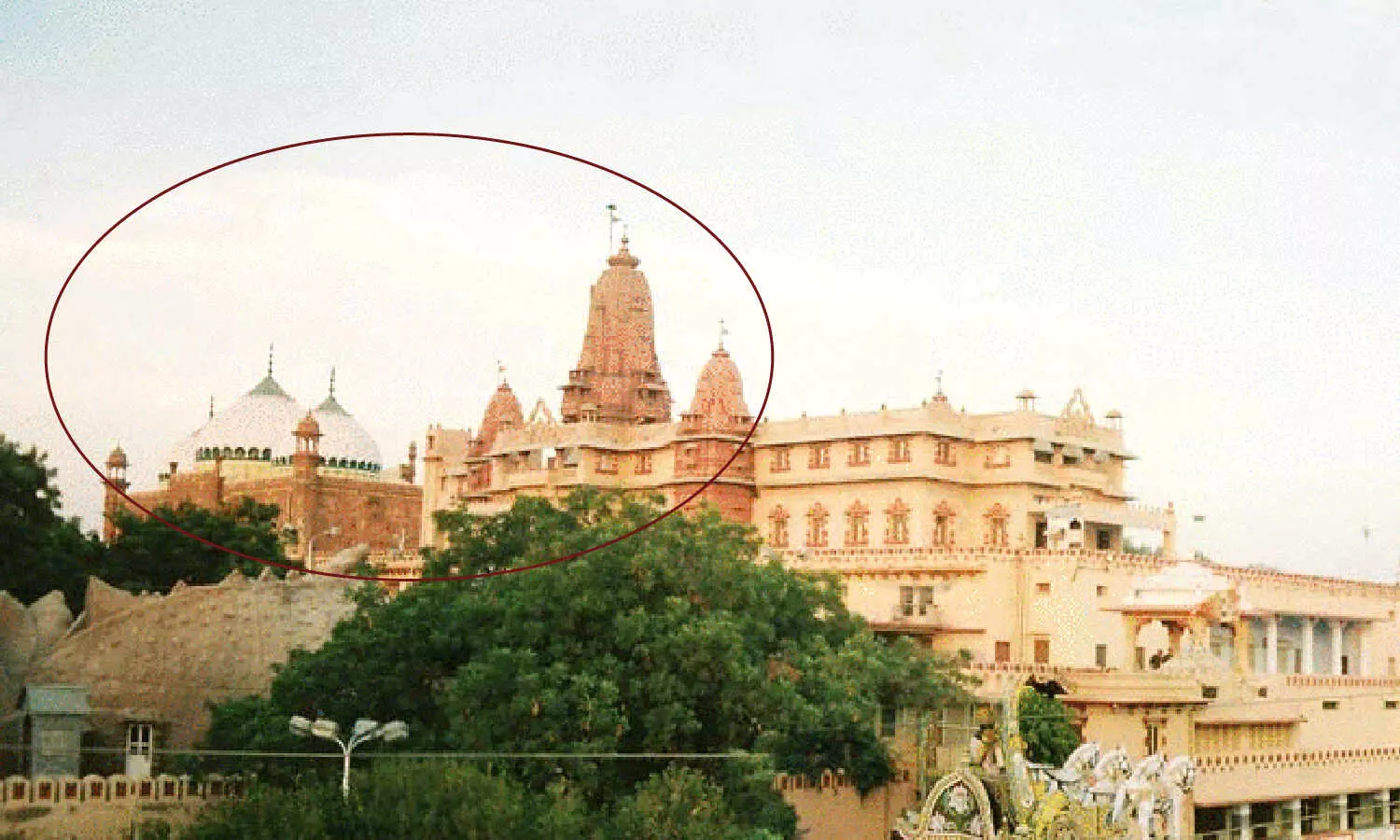
‘Once A Temple, Always A Temple’ Is A Judicially Recognized Principle Of Law: Allahabad HC While Rejecting Muslim Side’s Plea On Maintainability In Krishna Janmabhoomi Suits
 |
|The Allahabad High Court rejected a plea challenging the maintainability of 18 cases related to the temple-mosque dispute in Mathura, and ruled that the “religious character” of Shahi Idgah needs to be determined.
The Court dismissed the Muslim side’s contention that the suits filed by Hindu litigants relating to the dispute over the Krishna Janmabhoomi temple and the adjacent mosque violated the Places of Worship (Special Provisions) Act -- and were thus not maintainable.
The 1991 Act prohibits changing the religious character of any shrine from what existed on the day of the country's Independence. It exempted only the Ram Janmabhoomi-Babri Masjid dispute from its purview.
The cases filed by the Hindu side seek the “removal” of the Aurangzeb-era mosque they claim was built after demolishing a temple that once stood there.
Shahi Masjid committee secretary Tanvir Ahmad said they are studying the high court order and will approach the Supreme Court against it.
In his ruling, Justice Mayank Kumar Jain said the 1991 Act did not define the term “religious character” and the "disputed" place cannot have have a dual religious character -- of a temple and a mosque, which are “adverse to each other” -- at the same time.
“Either the place is a temple or a mosque. Thus, I find that the religious character of the disputed place as it existed on August 15, 1947 is to be determined by documentary as well as oral evidence led by both the parties,” the judge said.
The Court added, “This Court finds substance in the argument of the plaintiffs that the principle ‘first in existence’ or ‘prior in existence’ is the determinative factor for deciding the applicability of the provisions of the Act of 1991. The arguments of learned Senior Counsel, Sri C. S. Vaidyanathan, that ‘once a temple, always a temple’ is a judicially recognized principle of law and learned Counsel, Sri Satyaveer Singh, that ‘resolution always stays alive’ (संकल्प हमेशा जिंदा रहता है, और यह क भी मेरता नहीं है) are also indicative of the religious character of the property as temple.”
He concluded that the cases "do not appear to be barred by any provisions of the Wakf Act, 1995: the Places of Worship (Special Provisions) Act, 1991; the Specific Relief Act, 1963; the Limitation Act, 1963 and Order XIII Rule 3A of the Code of Civil Procedure Code, 1908".
Hindu side counsel Vishnu Shankar Jain told reporters that with the dismissal of the plea challenging maintainability, the high court will continue to hear all related cases on the temple-mosque issue.
Jain also said the Hindu side will now move the Supreme Court asking it to vacate its stay on an earlier Allahabad High Court order that had allowed a survey of the mosque.
The Hindu litigants claim the mosque holds signs suggesting that it was a temple once.
The mosque management committee and the UP Sunni Central Waqf Board had argued that the suits were barred under Places of Worship Act and other laws. On May 31, the Allahabad High Court reserved its judgment on this maintainability plea after hearing both sides.
However, the Court reopened the hearing at the request of Shahi Idgah counsel Mehmood Pracha. The judgment, pronounced Thursday, was finally reserved on June 6.
The high court has now fixed August 12 as the date for framing of issues.
In April 2024 the Apex Court had issued official notice in the special leave petition filed by the Shahi Masjid Idgah challenging the order passed by the Allahabad High Court which allowed a court-monitored survey of the Shahi Idgah Mosque complex. The Court also clarified that it has not stayed the proceedings pending before the Civil Judge, Mathura.
The Mathura dispute mirrors the legal tussle in Varanasi, where the Gyanvapi mosque and the Kashi Vishwanath temple are located next to each other.
Last December, the Allahabad High Court had dismissed pleas challenging the maintainability of a 1991 suit seeking the “restoration” of a temple where the Gyanvapi mosque stands.
"Either the Gyanvapi compound has a Hindu religious character or a Muslim religious character. It can’t have dual character at the same time,” Justice Rohit Ranjan Agarwal had then said, while ruling that the Varanasi case was not barred under the Places of Worship Act.
Cause Title: Bhagwan Shrikrishna Virajman At Katra Keshav Dev Khewat No. 255 & Ors. v. U.P. Sunni Central Waqf Board & Ors.
Appearance:
Plaintiff: S/Sri C.S. Vaidyanathan, learned Senior Counsel, Hari Shanker Jain, Vishnu Shanker Jain, assisted by Ms. Mani Munjal and Mr Parth Yadav, Rahul Sahai, learned Senior Counsel, Anil Kumar Airi, learned Senior Counsel, Mahendra Pratap Singh, Saurabh Tiwari, Ajay Kumar Singh, Hare Ram Tripathi, Prabhash Pandey, Pradeep Kumar Sharma, Vinay Sharma, Gaurav Kumar, Siddharth Srivastava, Anil Kumar Singh, Ashish Kumar Srivastava, Ashvanee Kumar Srivastava, Satyaveer Singh, Dr. Dharmesh Chaturvedi, Arya Suman Pandey, Rama Nand Gupta, Harshit Gupta, Saurabh Basu, Gopal Srivastava, Anil Kumar Bisen, Ajay Pratap Singh, Rana Singh, Amit Kumar, Naman Kishore Sharma, Jawahar Yadav, Kumar Beenu Singh, Aniruddh Tiwari, Ugrasen Kumar Pandey, Radhey Shyam Yadav, Brahm Kumar Tiwari, Mayank Singh, Tejas Singh, Alok Dubey, Kumar Anish, A. K. Malviya, Amitabh Trivedi, Rajesh Kumar Shukla, Mrs. Rama Goyal Bansal and Mrs. Reena N Singh, learned Counsel for the plaintiffs. S/Sri Rajendra Maheshwari, Advocate and Ashutosh Pandey
Defendants: Advocates Tasneem Ahmadi, S/Sri Mehmood Pracha, Nasiruzzaman, Pranav Ojha, Hare Ram Tripathi, Manoj Kumar Singh, Afzal Ahmad, Tanveer Ahmad and Imran
Click here to read/download Judgment
With PTI Inputs